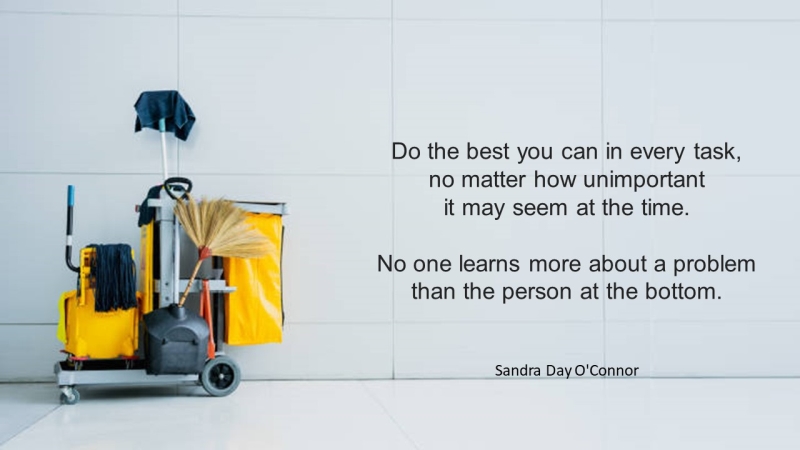HAVE YOU EVER BEEN GIVEN A TASK THAT SEEMED SMALL OR UNIMPORTANT? It may be something you didn’t think was worth your time or effort. But, no matter how little the task may appear, there is always room for improvement and the chance to have a positive impact. This article will explore why it’s essential to do your best in every task and how even the person at the bottom can be the best person to learn from.
Why Every Task Matters
Every task you do contributes to your personal and professional growth, no matter how small or seemingly insignificant. Doing your best in every task builds habits of excellence and demonstrates a commitment to your work. Remember, you never know who may be watching or what opportunities may arise from doing your best in every task.
It Sets the Tone
When you’re given a task, how you approach it sets the tone for how others will approach it. If you put in the effort and do your best, others are more likely to do the same. Half-heartedly completing the task sends the message that the work is optional and needs to be done well. The repercussions could affect the whole group or company.
It Builds Habits
Doing your best in every task builds a habit of excellence. It sets the expectation that you will always strive for your best, no matter the circumstance. Over time, this will become a habit, and you’ll find yourself giving your best effort even when it’s not required.
It Builds Trust
When you consistently do your best, it builds trust with those around you. This can lead to more chances to grow and move up, as well as more respect and attention. Your colleagues and supervisors know they can count on you to give your all and produce quality work.
Learning from the Bottom
Even if you’re given a seemingly unimportant task, you are the best person to learn from and identify improvement areas. Here’s why:
You’re Closest to the Work
You’re the closest to getting to work when you’re given a task. This means you are uniquely positioned to know where the job could be done better or more quickly. You’re the one who knows the ins and outs of the undertaking, and you’re the one who will see the immediate impact of any changes or improvements.
You Have a Fresh Perspective
As the person at the bottom, you may have a fresh perspective on the task that others in the organization may not have. You may see opportunities for improvement or innovation that others have overlooked. Your unique perspective can be precious in driving positive change.
You’re Building Skills
Even if the task seems small, every job is an opportunity to build skills and gain experience. You may be learning new software, improving your communication skills, or developing your ability to manage time and resources effectively. These skills can be valuable in your current role and future positions.
Taking Ownership of Your Work
Another reason why doing your best in every task is important is that it shows that you take ownership of your work. When you do your best, you’re taking responsibility for the quality and outcome of the task. This demonstrates a commitment to your work and a willingness to go above and beyond what’s expected.
It Builds Confidence
Taking ownership of your work can also build your confidence. When you do your best and take ownership of the task, you’re showing that you have the skills, knowledge, and ability to complete the task successfully. This can help you feel more confident in your skills and increase your self-esteem.
It Demonstrates Professionalism
Taking ownership of your work is also a demonstration of professionalism. It shows that you’re dedicated to your work and take it seriously. This can be especially important in a professional setting, where you want to be viewed as a competent and reliable team member. Demonstrating professionalism can also lead to more opportunities for growth and advancement within your organization.
It Shows Your Values
Doing your best in every task can also be a reflection of your personal values. It shows you have a strong work ethic and a commitment to excellence. This can be crucial to building your reputation inside and outside your company.
Overcoming Resistance to Mundane Tasks
It’s easy to convince ourselves that routine chores aren’t worth our time and energy. After all, why spend time and energy on something that seems unimportant? But it’s important to realize that not wanting to do these things can be a significant obstacle to success.
Changing your perspective can help you push over this reluctance. Instead of viewing the task as unimportant, try to see it as an opportunity to improve your skills or knowledge. For example, if you’re asked to file paperwork, view it as a chance to practice your organizational skills. Or if you’re asked to make copies, view it as a chance to practice your attention to detail.
Another way to overcome resistance is to break the task into smaller, more manageable pieces. This can help you stay motivated and avoid feeling overwhelmed. By setting achievable goals and focusing on one step at a time, you can make progress and build momentum.
The Benefits of Doing Your Best
Doing your best in every personal and professional task has numerous advantages. Here are a few to consider:
- Improved self-esteem: By doing your best, you can feel proud of your accomplishments and build self-confidence.
- Enhanced reputation: By demonstrating a commitment to excellence, you can build a positive reputation with your coworkers, clients, and other stakeholders.
- Increased opportunities: By consistently doing your best, you can position yourself for new opportunities and advancement within your organization.
- Higher quality output: By taking pride in your work and striving for excellence, you can produce higher quality output and achieve better results.
- Better teamwork: You can contribute to a positive team culture and build stronger relationships with your colleagues by doing your best.
Balancing Excellence with Realistic Expectations
It’s essential to do your best in every task, but it’s also important to have reasonable expectations. It’s only sometimes possible to achieve perfection; sometimes, it’s more important to focus on making progress than attain flawless results.
One way to balance excellence with realistic expectations is to set goals and priorities. By setting clear goals and prioritizing your tasks, you can focus on what’s most essential and avoid getting bogged down in small details.
It’s essential to recognize that we all make mistakes and have limitations. Another way to balance excellence with realistic expectations is to practice self-compassion. By being kind to ourselves and practicing self-care, we can avoid burnout and maintain our motivation and focus.
Conclusion
In conclusion, every task, no matter how unimportant, is an opportunity to learn, grow, and make a difference. By doing your best in every task, you’re building habits of excellence, building trust with those around you, and demonstrating a commitment to your work. Moreover, your position at the bottom of the hierarchy makes you an ideal student of the work and a source of ideas for enhancing it.
Remember, you never know who is watching or what opportunities may arise due to giving your all in every task. So next time you’re given a seemingly unimportant task, take ownership of it and do your best. You always need to find out where it may lead you.



